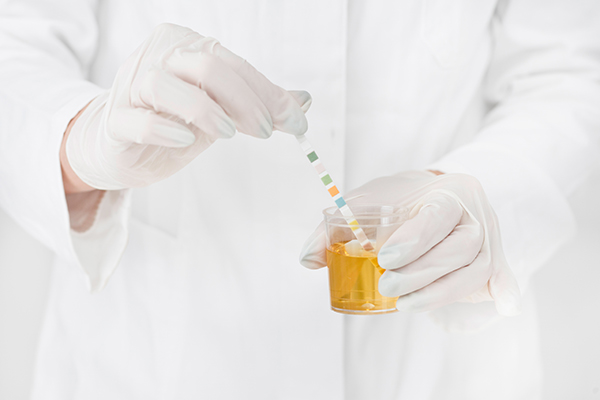Drug testing can be performed for several reasons and is usually done to test for compliance or to detect illicit substances in a person’s system. The National Institute on Drug Abuse says:
Some schools, hospitals, and places of employment require drug testing. There are several ways this can be done, including pre-employment testing, random testing, reasonable suspicion/cause testing, post-accident testing, return to duty testing, and follow-up testing. This usually involves collecting urine samples to test for drugs such as marijuana, cocaine, amphetamines, PCP, and opioids. Drug tests vary, depending on the type of drug being tested for and the type of specimen being collected. Urine, hair, saliva (oral fluid), or sweat can be used as test specimens. Mandatory guidelines for federal workplace drug testing of urine specimens were established in 1988 and updated in 2017. In 2019, Congress allowed federal executive branch agencies to also collect and test oral fluid specimens as part of their drug testing programs. (NIDA)
How Drug Tests for Benzodiazepines Work?
All drug tests are done in panels, and each panel is a drug that is being tested for. The 5-panel drug screen is the most common and tests for the presence of 5 different drugs: marijuana (THC), cocaine (COC), opiates (OPI), amphetamines (AMP), and phencyclidine (PCP). There is also a 7-panel test which tests for the same substances in a 5-panel drug screen along with benzodiazepines and barbiturates. In addition to the 5- and 7-panel drug screens, there are expanded testing panels or 8- to 12- panel tests. These expanded tests can detect the presence of ecstasy (MDMA), methadone, buprenorphine, propoxyphene, quaaludes, and hydrocodone/oxycodone.
What Can a False Positive Result For Benzos?
Most anyone that has or has had a substance abuse disorder is very familiar with a UDS or urine drug screen. A UDS can be a major source of anxiety for someone struggling with an addiction to benzodiazepines or other drugs. Instant-read urine drug screens are the most common type of drug test done. They are simple, cheap, and produce rapid results. These tests, also known as immunoassays, detect substances above a certain threshold using antibodies, but immunoassay tests have poor specificity which can lead to false-positive readings. This is why instant-read tests are usually always sent off to a lab for further testing and confirmation.
Which Medications Lead To False-Positive Results For Benzodiazepines?
False-positive readings for benzodiazepines are common and can be caused by certain medications the individual may be taking at the time of testing. Some of the medications that can cause a false-positive benzodiazepine result can include:
- Oxaprozin (Daypro)
- Sertraline (Zoloft)
- Tolmetin (Tolectin)
- Naproxen (Aleve)
- Etodolac (Lodine)
- Fenoprofen (Nalfon)
Most of these medications are NSAIDS or nonsteroidal anti-inflammatory drugs used to treat inflammation and arthritis. Sertraline or Zoloft is an antidepressant known as an SSRI or selective serotonin reuptake inhibitor. If you are taking any of these medications and require a urine drug screen, it’s very important to let the testing site or person that ordered the test know.
Treatment for Benzo Addiction at Evoke Wellness at Cohasset
If you or someone you love is struggling with an addiction to benzodiazepines, our addiction specialists are available around the clock to assist you. Evoke Wellness at Cohasset offers evidence-based treatment programs to cater to the individual needs of each patient. Our solution-focused addiction treatment will lead you on a road to long-lasting recovery. You don’t have to suffer any longer, call us today.




